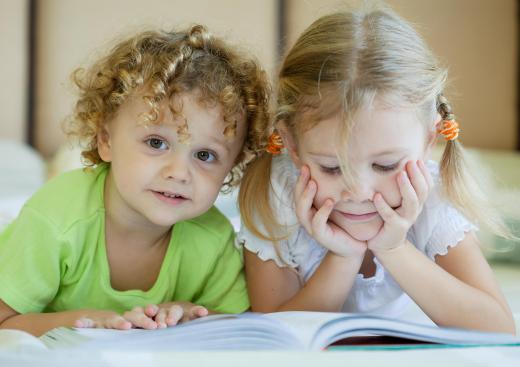At WiseGEEK, we're committed to delivering accurate, trustworthy information. Our expert-authored content is rigorously fact-checked and sourced from credible authorities. Discover how we uphold the highest standards in providing you with reliable knowledge.
What is Pediatric Speech Therapy?
Pediatric speech therapy is used when a child under the age of 18 needs help with letter or word pronunciation, or has trouble speaking in general. Many of these children have disabilities, so the speech therapist should have some experience working with mentally and physically disabled kids. Still, many more children who participate in speech therapy are academically average and have trouble communicating for other reasons.
The first step in pediatric speech therapy is to test each child to determine what types of problems he or she is having. Some children may have a stutter or stammer when they speak, while others will have issues pronouncing entire words or certain letters. Pediatric speech therapy is also beneficial for kids who have trouble hearing, because they often have difficulties understanding what sounds each letter is supposed to make. To test each child, he or she may be asked to repeat words or sounds, write certain words, or practice rhyming.

Once it is determined that a child may benefit from ongoing pediatric speech therapy, the therapist will schedule appointments based on the condition and the severity of the condition. These sessions may take place certain days at school, after school, at the child’s home, or in a designated office provided by the speech therapist. Each session is likely to last anywhere from one hour to one and a half hours, depending on the age and condition of the child. During treatment, children may be asked to read aloud, repeat various words or phrases, use various rhyming or alliteration techniques, and answer questions about a story that has been read or told aloud by the therapist.

The duration of pediatric speech therapy treatment could last months or even years depending on the condition’s severity. For someone who has hearing impairments, it could be ongoing throughout childhood to ensure that reading and speaking tasks are progressing smoothly. The frequency of sessions may lessen over time as obstacles are overcome and new speech patterns are formed.

Pediatric speech therapy may also focus on helping children who are having trouble learning to read. Phonics are an important part in everyday communication, and a lack of reading skills can result in lower grades and further communication delays later on. Speech therapists may help children by having them read a story or school book aloud. This helps them learn the rhythm of written words, as well as allowing them to become comfortable reading in front of others. This can help to instill confidence, making harder reading tasks easier to grasp.
AS FEATURED ON:
AS FEATURED ON:













Discussion Comments
My nephew is autistic and is currently seeing a speech and language pathologist. I think this will be a long term thing for him as he really struggles in a lot of areas.
It can be very frustrating for kids when they have a hard time communicating. I think it is even more frustrating for them than the person trying to understand them.
We have seen quite a bit of improvement since he started the therapy, but there is still a long ways to go. I think the therapist also makes a big difference. He has had more than one, and the one he has now he really connects with, and we have seen a positive change in his attitude and ability.
I think the ability to read proficiently goes along with speech therapy. My daughter has a slight hearing impairment, so speaking clearly and reading have both been hard for her.
Once she started speech therapy, she also started working on her reading. The two seemed to really go hand in hand for her. As she improved in both of these areas, her grades improved and you could also tell she felt a lot better about herself.
@honeybees-- You are right about kids making fun of other kids who have trouble speaking properly. My son went through this in elementary school and it was really hard for him.
He had a hard time pronouncing the letter "r" correctly. You wouldn't think something this small would be a big deal, but it was.
I am glad I invested in some speech therapy for him after school. The other kids didn't know about this and it gave him the confidence he needed. After about 6 months there was a big improvement in his speech and he no longer needed the therapy.
I am glad this was something that was relatively easy to resolve, and am very thankful for the excellent speech therapist he had.
When my son was younger he stuttered sometimes when he spoke. Usually this happened when he was really excited about something and had a hard time getting the words out he wanted to say.
I was strongly thinking about getting some child speech therapy for him. Thankfully, this resolved before he started kindergarten and I didn't have to pursue the therapy. If this had persisted, I would have sought help for him because I think it would have been something that kids would have made fun of him about and that could have made everything much worse.
Post your comments